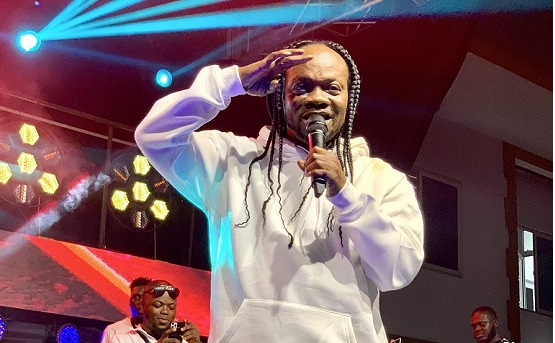HIS personal demeanor was quiet and unassuming, in stark contrast to the often loud and boastful nature of many of his followers.
These fans would frequently thrust him into unnecessary musical rivalries—especially with greats like Kojo Antwi.
Yet Charles Kwadwo Fosu, popularly known as Daddy Lumba, remained unfazed, refusing to be drawn into such debates. That was part of his enigmatic nature. Lumba’s music was deeply rooted in everyday life—capturing the journey from birth to love, heartbreak, struggle, and ultimately, death.
His songs resonated powerfully with audiences at parties, jamborees, and even funerals. But behind the booming speakers and thunderous applause was a man who walked quietly through life, never fully revealing his true self, even as he flaunted his flamboyance on stage.
Perhaps, this explains the many rumours that followed him—about his romantic escapades, the supposed jealousy of fellow musicians he mentored, and his personal life. The only time Lumba addressed these perceptions was through his music, notably with a revealing line: “I’m being accused of being a womanizer, but I am always by my loved one.”
In rare moments, his body language hinted at a desire to tell more—to set the record straight. Yet, his lips remained sealed, revealing only fragments of a carefully guarded identity.
His musical persona was layered with contradictions: warm and magnetic on stage, but distant and private in real life; ever-present in the minds of music lovers yet far removed from the gossip that swirled around him.
Lumba in the lens of Mark Okraku Mantey
Listening to Mark Okraku Mantey on the Joy Breakfast Show on Monday—three days after the passing of Daddy Lumba—I couldn’t help but believe in my enigmatic assessment of the man: a mystery, a riddle, hard to decode and even harder to fully understand.
With a musical journey dating back to his early days with the Lumba Brothers—alongside Nana Acheampong—and their debut album Yɛyɛ Aka Akwantuo Mu, which spotlighted the struggles of Ghanaians journeying abroad, Lumba helped define a unique brand of Highlife. This style, popularly known as Burger Highlife, was pioneered by other greats like George Darko and Lee Duodu.
Okraku Mantey, a prominent figure in Ghana’s entertainment industry who has studied Lumba’s career closely over the years, remains fascinated by the "Lumba mystery"—a phenomenon that began when the young Charles Kojo Fosu emerged almost as a clone of Akwasi Ampofo Agyei (Mr. A.A.A).
“That wasn’t surprising,” Mark explained, “because Lumba would return from school and go watch the rehearsals of Akwasi Ampofo Agyei’s band at Asante Mampong—they were both natives of the town.”
Daddy Lumba and the Evolution of Ghana’s Highlife: From Mimicry to Mastery
According to Mark, over time, Lumba carved out his own lane, blending Mr. A.A.A.’s soulful storytelling with emotionally gripping lyrical themes reminiscent of Adomako Nyamekye—the military officer-turned-musician whose bold criticisms of military rule got him in trouble with the PNDC regime led by Jerry John Rawlings.
It’s intriguing how Ghana’s Highlife music has evolved over the decades, with each generation echoing the spirit and needs of its time. We began with the nationalist struggle era, when legends like E.T. Mensah and the Ramblers band used music to encapsulate the hopes and aspirations of a young, independent nation.
Then came the golden era of storytelling—led by icons such as Dr. K. Gyasi, Akwaboah Snr, Alhaji K. Frimpong, Nana Kwame Ampadu, C.K. Mann, Paapa Yankson, and the all-rounder Alfred Benjamin Crentsil(AB Crentsil). Their lyrics painted vivid pictures of everyday life, cultural values, morality, and social commentary.
This was followed by the era of funky Highlife, pioneered by the likes of Joe Mensah, Alhaji Sidiku Buari, Pat Thomas, and the dynamic Gyedu Blay Ambolley, whose jazz-infused and funk-driven sound added another dimension to the genre.
But from the 1980s onward, a new wave known as Burger Highlife or Fusion Highlife emerged—blending traditional Ghanaian melodies with Western instrumentation and production styles.
George Darko’s iconic Ako Te Brofo opened the floodgates. Soon, others like Charles Amoah, Rex Omar, Rex Gyamfi, Thomas Frimpong among others followed, adding their unique voices to this modernised sound.
It was during this pivotal period that Daddy Lumba and his partner and friend Nana Acheampong emerged—forever changing the landscape of Highlife music. Their arrival coincided with the rise of Pan-Africanist-inspired acts like Nat Brew now Amandzeba and soon after, the birth of Hiplife, led by Reggie Rockstone.
This genre fused Hip-Hop and Ghanaian rhythms, and was influenced globally by artistes like Curtis Blow, Grandmaster Flash, Tupac Shakur, Biggie Smalls, Jay-Z, Ja Rule, Dr. Dre, Snoop Dogg and many more. Through all these phases, Daddy Lumba stood tall, evolving from mimicry to mastery.
His early imitation of icons like Akwasi Ampofo Agyei transformed into a unique and deeply personal style that captivated generations. His journey, layered with musical brilliance, personal triumphs, and a mystique that often-defied explanation, remains one of Ghana’s most compelling artistic evolutions.
Daddy Lumba was not just a musician—he was a phenomenon. A man whose legacy will remain enshrined in the heartbeats

